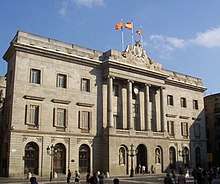City Council of Barcelona
The City Council of Barcelona (Catalan: Ajuntament de Barcelona; Spanish: Ayuntamiento de Barcelona) is the top-tier administrative and governing body of the municipality of Barcelona, Spain. In terms of political structure, it consists of the invested Mayor of Barcelona, currently Ada Colau, the Government Commission, and an elected 41-member deliberative Plenary (Consell Municipal) with scrutiny powers.[1][2]
City Council of Barcelona Ajuntament de Barcelona | |
|---|---|
 | |
| Type | |
| Type | |
| Leadership | |
Mayor | |
| Structure | |
| Seats | 41 |
.svg.png) | |
Political groups | Government (18)
Opposition (23) |
Length of term | 4 years |
| Elections | |
Last election | 26 May 2019 |
| Meeting place | |
 | |
| Casa de la Ciutat | |
| Website | |
| ajuntament.barcelona.cat | |
Mayor
The Mayor is elected by the members of the plenary among its members the day the new municipal corporation is formed after the local election. The officeholder has a mandate for the 4-year duration of the elected body. If the Mayor leaves office ahead of time a new voting may take place among the plenary members in order to invest a new mayor (meanwhile, another local councillor, conventionally the first deputy mayor, may act as acting Mayor). Since 13 June 2015 the Mayor is Ada Colau.[3] The opening session in which the Mayor is invested is traditionally held at the Saló de Cent.
Government Commission
The Government Commission (Comissió de Govern; also Junta de Govern or Junta de Gobierno) is formed by the Mayor, the Deputy Mayors, and a number of appointed councillors.
Municipal Council
_Plenari_Consell_Municipal.jpg)
The municipal council (Consell Municipal) is the body formed by the elected councillors of the Ajuntament. The plenary meetings (Ple) are held at the "Carles Pi i Sunyer" Hall. It is formed by the municipal councillors, elected through closed party list proportional representation. 41 councillors are currently elected on the basis of the population of the municipality. Councillors are grouped in Municipal Groups on the basis of their political filiation. The Municipal Council can also meet in Commissions (akin to parliamentary committees).[4]
A list of local elections (electing the councillors of the Plenary) since the restoration of the democratic system is presented as follows:
- Barcelona City Council election, 1979 (43 councillors)
- Barcelona City Council election, 1983 (43 councillors)
- Barcelona City Council election, 1987 (43 councillors)
- Barcelona City Council election, 1991 (43 councillors)
- Barcelona City Council election, 1995 (41 councillors)
- Barcelona City Council election, 1999 (41 councillors)
- Barcelona City Council election, 2003 (41 councillors)
- Barcelona City Council election, 2007 (41 councillors)
- Barcelona City Council election, 2011 (41 councillors)
- Barcelona City Council election, 2015 (41 councillors)
- Barcelona City Council election, 2019 (41 councillors)
Public bodies and companies
A part of the management is conducted by entities wholly or partially owned by the Ajuntament:[5]
- Autonomous bodies
- Instituto Municipal de Personas con Discapacidad
- Instituto Municipal de Informática de Barcelona
- Instituto Municipal de Hacienda
- Instituto Municipal de Mercados de Barcelona
- Instituto Municipal de Educación de Barcelona
- Instituto Municipal del Paisaje Urbano y la Calidad de Vida
- Instituto Municipal Barcelona Deportes
- Instituto Municipal de Servicios Sociales de Barcelona
- Public business entities
- Instituto Municipal Fundación Mies van der Rohe
- Instituto Municipal de la Vivienda y Rehabilitación
- Instituto Municipal de Parques y Jardines
- Instituto Municipal de Urbanismo
- Instituto de Cultura de Barcelona
- Limited companies
- Barcelona Ciclo del Agua, SA - BCASA
- Información y Comunicación de Barcelona, SA
- Barcelona Activa SAU SPM
- Barcelona de Servicios Municipales, SA - BSM
- Parque de Atracciones Tibidabo, SA
- Tratamiento y Selección de Residuos, SA - TERSA
- Selectivas Metropolitanas, SA - SEMESA
- Soluciones Integrales para los Residuos, SA - SIRESA
- Cementerios de Barcelona, SA
- Mercabarna
- Barcelona de Infraestructuras Municipales, SA - BIMSA
- Fomento de Ciudad, SA
- Consortiums, foundations and associations
- Fundación Museo Picasso de Barcelona
- Fundación Barcelona Institute of Technology for the Habitat
- Asociación Red Internacional de Ciudades Educadoras
- Instituto Infancia y Adolescencia de Barcelona, C.
- Consorcio Campus Interuniversitario Diagonal-Besòs
- Agencia de Ecología Urbana de Barcelona
- Agencia Local de la Energía de Barcelona
- Consorcio del Besòs
- Consorcio de Bibliotecas de Barcelona
- Consorcio Mercat de les Flors
- Consorcio Localret
- Consorcio Museo de Ciencias Naturales de Barcelona
- Consorcio Museo de Arte Contemporáneo de Barcelona
- Consorcio de L'Auditori y la Orquestra
- Fundación Barcelona Cultura
- Fundación Navegación Oceánica de Barcelona
- Fundación Carles Pi i Sunyer de Estudios Autonómicos y Locales
- Fundación Privada Julio Muñoz Ramonet
- Fundación Barcelona Mobile World Capital Foundation
- Red de Juderías de España, Caminos de Sefarad
- Agència de Salut Pública de Barcelona
- Consorcio Institut d’Infància i Món Urbà
- Consorcio Campus Interuniversitari del Besòs
- Agencia de Ecología Urbana de Barcelona
- Agencia Local de la Energía de Barcelona
- Consorcio del Besòs
- Consorcio de Bibliotecas de Barcelona
- Consorcio del Mercat de les Flors/Centre de les Arts de Moviment
- Consorcio El Far
- Consorcio Local Localret
- Foundations and associations
- Fundación Barcelona Cultura
- Fundación Navegación Oceánica de Barcelona
- Asociación Red Internacional de Ciudades Educadoras
Notes
- Supports government, while sitting in opposition
See also
References
- "Barcelona despide a 26 de sus 41 concejales". El Periódico. 2015-06-10.
- "La organización". Ajuntament de Barcelona.
- Aroca, Jaume V. (2015-06-13). "Ada Colau, elegida nueva alcaldesa de Barcelona". La Vanguardia.
- "Organització i funcionament de l'Ajuntament de Barcelona" (PDF).
- "Entidades municipales en el ámbito de la transparencia".